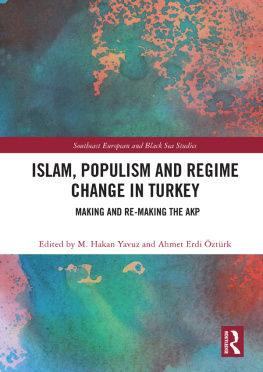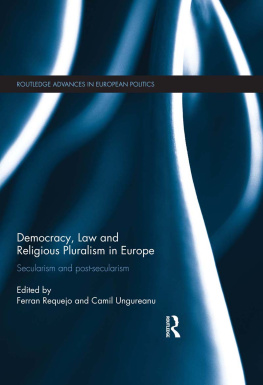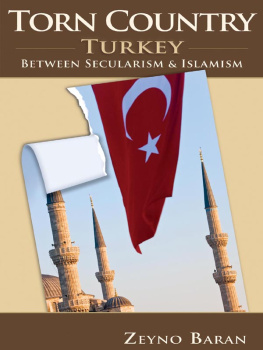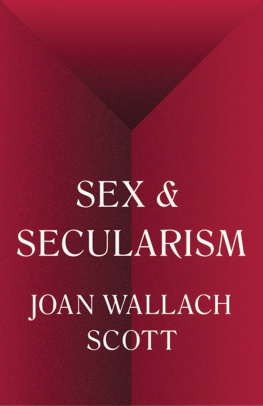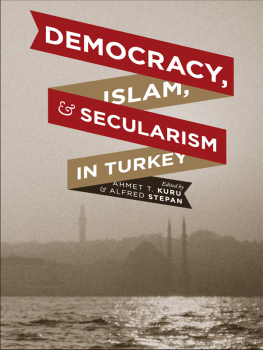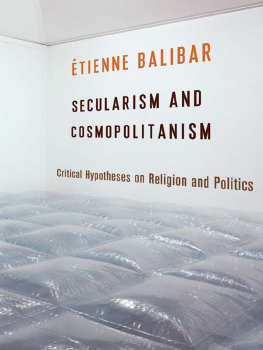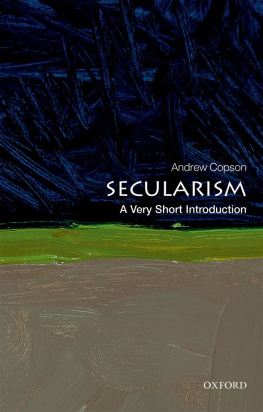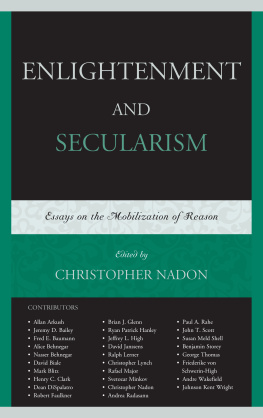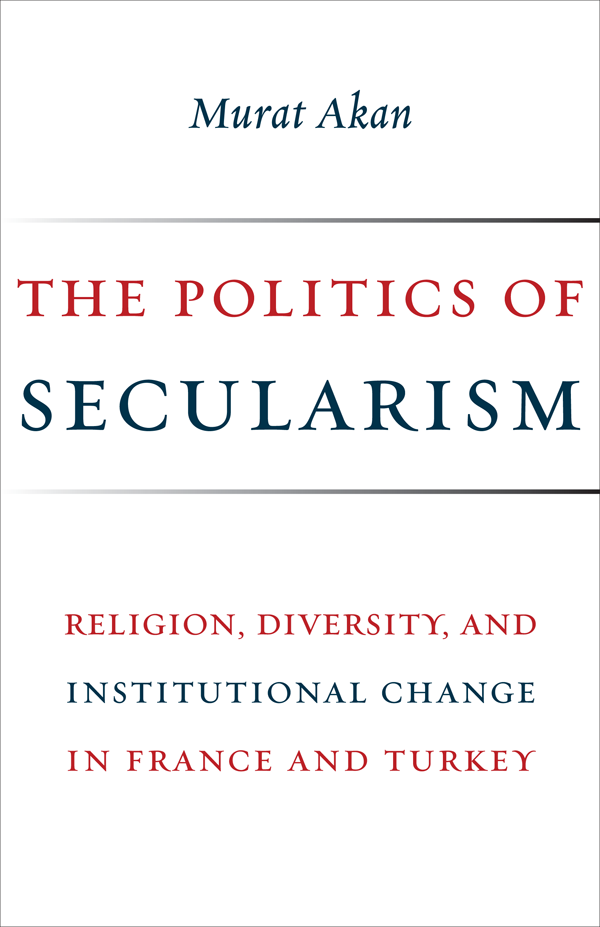Contents
Guide
Pagebreaks of the print version
THE POLITICS OF SECULARISM
Religion, Culture, and Public Life
RELIGION, CULTURE, AND PUBLIC LIFE
Series Editor: Katherine Pratt Ewing
The resurgence of religion calls for careful analysis and constructive criticism of new forms of intolerance, as well as new approaches to tolerance, respect, mutual understanding, and accommodation. In order to promote serious scholarship and informed debate, the Institute for Religion, Culture, and Public Life and Columbia University Press are sponsoring a book series devoted to the investigation of the role of religion in society and culture today. This series includes works by scholars in religious studies, political science, history, cultural anthropology, economics, social psychology, and other allied fields whose work sustains multidisciplinary and comparative as well as transnational analyses of historical and contemporary issues. The series focuses on issues related to questions of difference, identity, and practice within local, national, and international contexts. Special attention is paid to the ways in which religious traditions encourage conflict, violence, and intolerance and also support human rights, ecumenical values, and mutual understanding. By mediating alternative methodologies and different religious, social, and cultural traditions, books published in this series will open channels of communication that facilitate critical analysis.
For a complete list of books in the series, see .
The Politics of Secularism
RELIGION, DIVERSITY, AND INSTITUTIONAL CHANGE IN FRANCE AND TURKEY
Murat Akan

Columbia University Press
New York
Columbia University Press
Publishers Since 1893
New YorkChichester, West Sussex
cup.columbia.edu
Copyright 2017 Columbia University Press
All rights reserved
E-ISBN 978-0-231-54380-4
Library of Congress Cataloging-in-Publication Data
Names: Akan, Murat, 1973 author.
Title: The politics of secularism: religion, diversity, and institutional change in France and Turkey / Murat Akan.
Description: New York : Columbia University Press, 2017. | Series: Religion, culture, and public life | Includes bibliographical references and index.
Identifiers: LCCN 2016053253| ISBN 978-0-231-18180-8 (cloth : alk. paper)
Subjects: LCSH: SecularismPolitical aspectsFrance. | SecularismPolitical aspectsTurkey. | Church and stateFrance. | Islam and stateTurkey.
Classification: LCC BL2765.F8 A58 2017 | DDC 322/.10944dc23
LC record available at https://lccn.loc.gov/2016053253
A Columbia University Press E-book.
CUP would be pleased to hear about your reading experience with this e-book at .
Cover design: Chang Jae Lee
For Fethi, Sandrine, and Roza
Contents
The rise of sociology wrote Antonio Gramsci in the Prison Notebooks ,
is related to the decline of the concept of political science and the art of politics which took place in the nineteenth century (to be more accurate, in the second half of that century, with the success of evolutionary and positivist theories). Everything that is of real importance in sociology is nothing other than political science. Politics became synonymous with parliamentary politics or the politics of personal cliques.
In the study of secularization, either one theory of sociological determinism replaces another or Hegelian or Weberian ideational approaches present the most common alternatives to sociologism. To situate the current state of the art in researching secularism vis--vis Gramscis remarks warning against limiting politics to parliamentary politics, our current knowledge of the politics of secularism can in fact benefit from restarting with the parliament today and in the nineteenth century. With the turn to ideas, studies of the place of religion in politics and society show increased theological tendencies in method. Thus they distance themselves slowly from Niccol Machiavellis simple and powerful lesson, supported by historical examples in The Prince , that even in analyzing the pope (or perhaps especially in analyzing the pope), we have to depart from the medieval tendency of focusing on ideas only and look also at action.
Moreover, some approaches present themselves in thinned form; that is, disregarding fundamental aspects of their original formulations. For instance, many Weberians forget Max Webers cautious remarks in The Protestant Ethic and the Spirit of Capitalism on studying the role of ideas: We are concerned with the influence that their conduct [religious ethics of the classes which were the culture bearers of their respective countries] has had. Now it is quite true that this can only be completely known in all its details when the facts from ethnography and folklore have been compared with it. Hence we must expressly admit and emphasize that this is a gap to which the ethnographer will legitimately object.
Webers gap is often bridged with assumptions rather than filled with research material. Those who follow from Hegel with the currently popularized concept imaginaries,
This book originated with these preliminary observations, and from two concerns. Weberians, instead of taking Webers gap seriously, often focus on isomorphic relations between sociology and action or ideas and action. Working on secularism in France and Turkey for almost two decades now, I kept noticing certain facts falling through the theoretical approaches and analytical frameworks appropriated in describing the politics of secularism and religion in these two critical cases. The most striking examples were exactly the kind of nonisomorphic relations that became invisible with sociologism and ideationalism. For example, in both France and Turkey some proponents of religion courses in public schools emerged from the ranks of opponents of the headscarf, and in Turkey defenders of state-salaried imams could be found among both proponents and opponents of the headscarf. Such facts were either ignored or explained away, but they were repetitive enough to be taken as a starting point for reflecting back on current theoretical approaches and analytical frameworks.
My second concern was the various hermeneutical turns that critical studies on modernity kept claiming in regular cycles in response to culturalist comparative accounts in general but still without success in cracking the codes of culturalism. What was at stake in these failed attempts was a political field that was within our reach but for some reason we just couldnt rest our eyes on. I hope that this book will at least partially rest our eyes and bridge some of the gaps between the analytical and hermeneutical schools in the social sciences.
This comparative project started with my work under Alfred Stepan at Columbia University. I never lost touch with Al after receiving my degree from Columbia. The many conversation-walks I took with him in New York and along the Bosporus in Istanbul were always illuminating and reinforced in me the idea that finishing a research project was only a beginning, and that sitting on a manuscript until you know you are done is difficult in todays academic environment of publish or perish but is still an option. By waiting I gained the opportunity to accumulate further primary sources and new conversation partners, and to appreciate the political struggles and people fighting for democracy in both France and Turkey at a depth beyond culturalist paradigms, a depth comparative research is in urgent need of.


